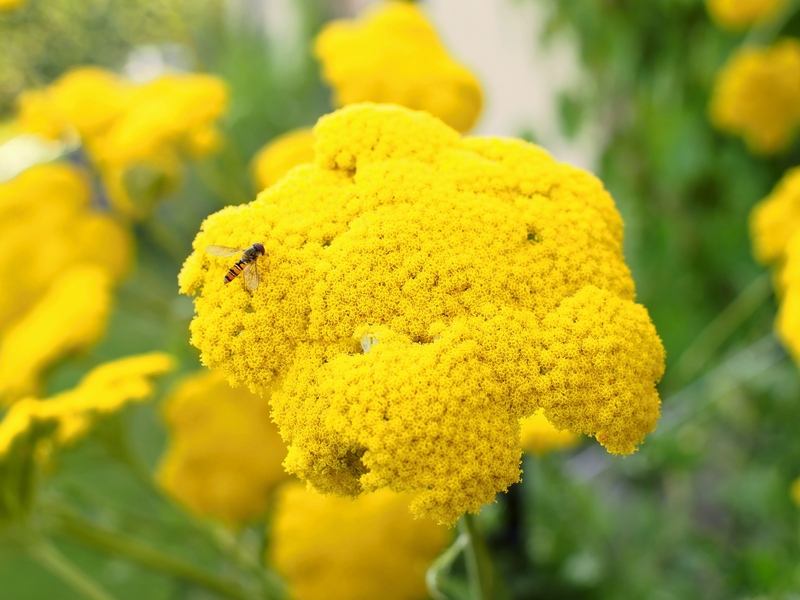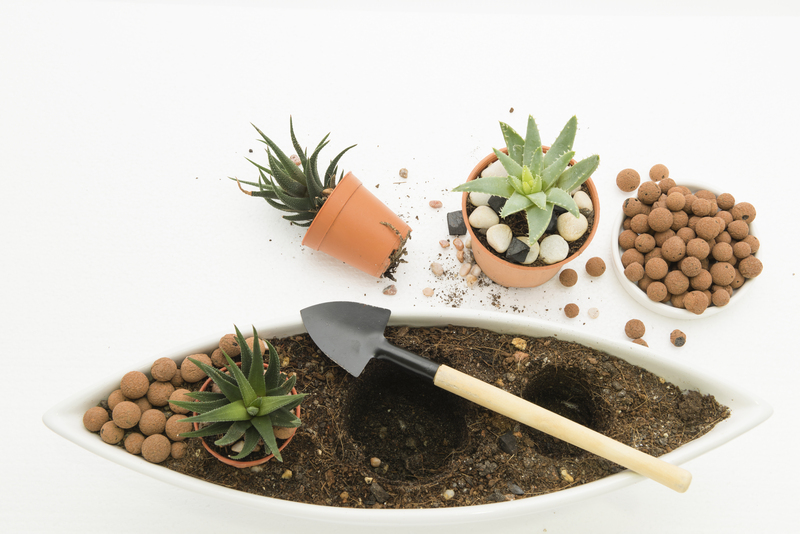Achieve a Pristine Garden with These 3 Weed Control Tips
Posted on 05/06/2025
Achieve a Pristine Garden with These 3 Weed Control Tips
If you aim to maintain a beautiful garden that's free of unsightly weeds, you're not alone. Garden enthusiasts everywhere strive for pristine flowerbeds and lawn areas, but weed management can be an ongoing challenge. Whether you're a beginner gardener or a seasoned green thumb, using the best weed control methods is crucial for preserving your garden's health and beauty.
In this comprehensive guide, we'll explore three essential weed control tips that can help you achieve a spotless garden. From prevention strategies to organic solutions, these expert approaches will make a noticeable difference--giving your landscape the polished, thriving look you've always wanted.
Why is Weed Control so Important in Gardening?
Before delving into specific tips, it's useful to understand why garden weed control is essential. Weeds not only detract from your lawn and garden's appearance, but also compete with your plants for vital resources like water, light, and nutrients. Left unchecked, weeds can quickly take over, stifling the growth of your cultivated plants and undermining your garden's long-term success.
- Weeds can spread rapidly, often outcompeting ornamental flowers, vegetables, and even robust shrubs and trees.
- Some weeds harbor pests or diseases, increasing your garden's vulnerability to infestations.
- Uncontrolled weeds can be unsightly, leading to a less appealing outdoor space.
Fortunately, a proactive approach to weed prevention and elimination can spare you headaches and ensure long-lasting beauty. Let's dive into three tried-and-true techniques that can help you master weed control in your garden.

1. Prevention: The First Line of Defense Against Weeds
Landscape Fabric and Mulch: Blocking Weeds Before They Start
One of the most effective weed control strategies is prevention. By limiting the ability of weed seeds to germinate and take hold, you can greatly reduce the need for remedial action.
Mulching is a classic and proven technique for suppressing weed growth. When you cover your soil with a thick layer of mulch (such as wood chips, bark, straw, or even grass clippings), you're creating a formidable barrier that prevents light from reaching weed seeds--making it tougher for them to sprout.
Benefits of Mulching for Weed Management
- Prevents light exposure, which is critical for weed germination.
- Helps retain soil moisture, minimizing nutrient loss and protecting plant roots.
- Regulates soil temperature, protecting plant roots in both hot and cold weather.
- Improves soil quality as organic mulches decompose over time.
In addition to mulch, landscape fabric offers another preventative measure. Placing landscape fabric or weed barrier beneath mulch or gravel creates a double layer of defense:
- Physical barrier denies weed seeds direct contact with soil.
- Reduces time spent on weeding, as fewer weeds break through to the surface.
- Ideal for garden beds, pathways, and under decks or patios.
Tips for Effective Use
- Apply mulch 2-4 inches deep for adequate coverage.
- Use organic materials to improve your garden's ecosystem as it breaks down.
- Replace mulch annually for ongoing weed suppression and soil nourishment.
- Overlap landscape fabric edges and secure with garden staples for maximum efficacy.
- Do not place mulch directly against plant stems, as this can encourage rot or disease.
*Prevention is always easier than remedying a weed infestation later.* If you focus on prevention, you'll spend less time pulling and spraying weeds and more time enjoying your lush, green sanctuary.
2. Manual Weed Removal: Tried, True, and Effective
Hand Pulling and Hoeing: Precision and Persistence
While prevention goes a long way, some weeds will inevitably break through. For these intruders, manual weed removal remains one of the most reliable methods. Whether you're maintaining ornamental beds, vegetable patches, or border plantings, regular removal keeps weeds from establishing deep root systems or spreading their seeds.
Hand-pulling is most effective when weeds are young and the soil is moist. Grip the weed firmly near the base and pull gently but steadily to extract the entire root system. Missing the root often leads to quick regrowth! For weeds with tenacious or taproots (like dandelions or thistles), consider using a weeding tool or garden fork for leverage.
Tools for Efficient Weed Removal
- Hand trowels: Perfect for small, shallow-rooted weeds.
- Weeding knives or hori hori tools: Excellent for tight spots or between pavers.
- Garden hoes: Ideal for larger areas and annual weeds. Use a scuffle hoe for shallow running or a stirrup hoe to slice weed tops.
Key Techniques for Clear Results
- Weed after rain or watering, as moist soil makes root removal easier.
- Remove weeds before they seed, preventing future spread in your garden.
- Carry a bucket or bag, and collect all removed plant debris to prevent accidental reseeding.
- Check for hidden roots, especially with perennials like bindweed or creeping Charlie.
Persistence is essential when it comes to manual weed control. Set aside time each week for a quick inspection and weed removal session. Over time, you'll notice fewer and fewer unwanted plants appearing--rewarding your commitment to a pristine, weed-free garden.
3. Organic and Natural Methods: Eco-Friendly Weed Control Solutions
Cultivating a Healthy, Balanced Garden Ecosystem
More gardeners than ever are seeking organic weed control techniques to keep their gardens safe for pets, pollinators, and children. Commercial herbicides may eradicate weeds, but often carry risks to desirable plants and local wildlife. That's why integrating natural solutions can help you achieve pristine results without synthetic chemicals.
Smothering Weeds With Sheet Mulching
- Sheet mulching, also called "lasagna gardening," involves layering cardboard or several layers of newspaper directly over weedy soil, then topping with mulch or compost. This blocks sunlight and smothers existing weeds, allowing you to reclaim infested beds sustainably.
- Breaks down naturally, enriching the soil with organic matter over time.
Vinegar and Boiling Water: Simple DIY Weed Remedies
- Vinegar (acetic acid products) can be sprayed directly on young weeds to desiccate foliage. Note: Vinegar is non-selective and will kill or damage any plant it contacts, so apply carefully on non-windy days.
- Boiling water is especially effective for weeds growing between hardscape or pavers. Pouring boiling water directly onto weeds destroys plant cells, killing them down to the root system.
Corn Gluten Meal and Salt: Preventing Weed Germination
- Corn gluten meal is a natural pre-emergent herbicide that can be safely spread over lawns and beds in the spring, inhibiting weed seed germination.
- Table salt (used sparingly on cracks and crevices) can prevent unwanted plant growth, but beware: salt persists in the soil and can damage wanted plants if overused.
Encouraging Dense Plantings and Ground Covers
- Thick, healthy plantings such as groundcovers, low shrubs, or aggressive perennials naturally shade out weeds and block available space.
- Living mulch like clover or creeping thyme can be used between garden rows or as a pathway cover to minimize weed incursion.
Focusing on these eco-friendly weed management tactics not only helps you achieve a pristine garden, but also contributes to the health and resilience of your entire landscape.
Frequently Asked Questions About Weed Control for Pristine Gardens
How often should I weed my garden?
Consistency is key! Proper garden weed removal is best done weekly, especially during peak growing season. Regular small sessions are more effective (and less overwhelming) than infrequent, intensive weed pulling.
Is mulching enough to stop all weeds?
While mulching is highly effective, especially in combination with landscape fabric, some persistent weeds--like those with deep roots or tubers--may break through. Always stay vigilant and address any emerging weeds promptly.
What's the best way to prevent weeds in vegetable gardens?
A combination of methods works best:
- Apply mulch between rows to limit light and retain moisture.
- Weed by hand before plants mature and compete for nutrients.
- Consider organic pre-emergent options, such as corn gluten meal, if you're growing from seed.
Are chemical weed killers safe for flower or vegetable beds?
*Chemical herbicides may control weeds, but always read the label and use cautiously--especially near edible crops or pollinator plants.* Consider organic or manual methods, particularly if you wish to avoid groundwater contamination or harm to beneficial insects.

Conclusion: Achieving Weed-Free Perfection in Your Garden
A lush, weed-free landscape is within reach for gardeners who are proactive and persistent. By focusing on these three critical areas--prevention, manual removal, and natural weed management--you'll find weed outbreaks become fewer over time, and your healthy plants can truly thrive.
Don't let weeds win! Make these weed control tips part of your regular gardening routine and watch as your outdoor spaces transform into impeccable showcases of nature's beauty. With a bit of dedication and the right knowledge, your pristine garden will be the envy of the neighborhood.
Quick Recap: Three Key Weed Control Tips for a Pristine Garden
- Prevention is paramount: Use mulch and landscape fabric to stop weed seeds from sprouting.
- Manual removal matters: Regular hand weeding or hoeing ensures weeds don't outcompete your plants.
- Organic solutions work: Employ eco-friendly methods like sheet mulching, vinegar, and dense plantings.
Commit to these approaches, and you'll enjoy a verdant, refined, and beautifully maintained weed-free garden all season long!
Latest Posts
Transforming Your Space with a Beautiful Herb Garden
Exciting Ways to Design Garden Seating for Relaxation and Fun
Elevate Your Garden's Defense Against Severe Weather Incidents
Elegant Hedge Shapes: Elevate Your Home Exterior with Artful Trimming

